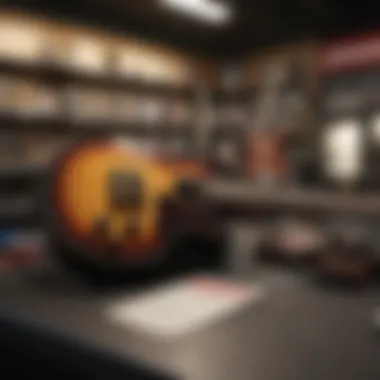Understanding Guitar Center Gear Card Payment Options


Intro
Navigating financial frameworks related to musical equipment can be complex. This article focuses on understanding Guitar Center’s Gear Card, which serves as a specialized financing tool for musicians and enthusiasts alike. A detailed overview will facilitate comprehension of covered options, terminologies, and potential pitfalls. Preparation helps in maximizing the advantages provided by the Gear Card. Bassists, drummers, and guitarists can all mentor their budgets with dignity. Key points will feature here, guiding readers through essential aspects relevant for informed decisions.
Understanding Loans
Guitar Center offers a Gear Card as a form of financing, tempered by a strict examination of its offerings. Various loans play into this understanding, creating challenges and opportunities for musicians.
- Types of loans are outlined clearly. Personal loans, for example, fill immediate individual needs. In contrast, specific solutions like the Gear Card directly relate to purchasing guitar gear and instruments. Personal loans might help buy equipment stores stating needs than necessarily centered on it. Therefore, a focused decision on how much you finance matters here.
- To qualify for loans, qualifications demand evaluation. It could include focusing attention on credit scores, debt-to-income ratios, and sources of possible income. Those seeking Guitar Center’s Gear Card may face adjusted potent reflect credit checks behind every loan.
- With loans unfold pros and cons. Here it varies. Personal loans might provide unbounded capacity while also carrying higher interest rates. The Guitar Center Gear Card's advantage is that it often carries lower overall costs as long as you manage payments efficiently.
Guitarists should keep financing in context to their longer operational plans with instruments. Knowledge clears muddy waters of ambitious purchasing or stress encircling financial management in everyday life.
Navigating Credit Cards
The credit cards category holds predominant weight in fostering meticulous fiscal control around the Gear Card. Recognizing as a credit tool, its effective operation demands understanding.
- Different categories present how useable credit cards can be. Cashback rewards appeal to frequent players spending power, while others also embed diverse cash back to restaurants or travel.
- Implementing credit utilization tips matters here as well. It is about effectively optimizing credit availabilities while not stretching limits typically ends precarious. It's critical to exercise limits connected to Guitar Center purchases and payments while reducing risk due to overutilization.
- Here we examine common pitfalls associated with credit usage. One could fall into carrying balances impassioned by overall interest rates accumulating budget collapse through mismanagement. A dangerous drop influences future opportunities and adds complexity spinning into payment setups.
As such partnerships exist within spending circumspect, summarizing duties requires adherence to stability connected around selected tools optimizing accessibility without overspending revealing options thereafter.
Understanding specifically detailing breakdowns equips musicians with timing to plan expenses naturally preceding purchases of their favorites vistas soulful.
Prolusion to Guitar Center Gear Card
The Guitar Center Gear Card serves as an important financial tool for musicians and audio professionals looking to purchase equipment and instruments. Understanding this card is essential for those who seek to manage their finances effectively while investing in high-quality gear. This section will explore the critical elements of the Gear Card, including its inherent benefits and some considerations to keep in mind.
Overview of Guitar Center Services
Guitar Center stands out as a prominent retailer in the musical instrument and audio equipment market. With its vast selection of guitars, amplifiers, microphones, and various accessories, it caters to a diverse group of customers. In addition to selling hardware, Guitar Center also offers services like equipment rentals, repairs, and lessons. Choosing to invest in specific tools via the Gear Card allows consumers to take advantage of these comprehensive services, promoting greater convenience for all types of musicians.
“Guitar Center aims to support musicians at every stage of their journey, offering both products and essential services.”
Through its professional-grade products and enhanced services, Guitar Center effectively creates an ecosystem where creativity can thrive. The Gear Card further enhances this by offering manageable financing options that empower customers. Understanding these offerings allows for smarter purchase strategies, benefiting anyone from hobbyists to seasoned performers.
What is the Gear Card?
The Gear Card is a private credit card specifically designed for Guitar Center customers. It provides a streamlined method for financing purchases related to music. Offering specialized terms distinct from traditional credit cards, it holds rebates for musicians, including promotional financing offers. Customers can leverage the Gear Card to acquire gear without necessitating full payment upfront, thereby smoothing the financial demands often associated with high-value equipment.
Through this card, Guitar Center promotes financial flexibility. One can purchase instruments or equipment even when immediate cash isn’t available. Such reasons underscore the importance of the Gear Card in participating accurately and effectively in today's music market.
As the following sections will demonstrate, understanding how to use the Gear Card also involves grasping its benefits, comfortable management, and exploring its potential drawbacks—necessary aspects for a financially sound purchasing choice.
Features of the Gear Card
The Gear Card provides several features that can enhance the experience of purchasing musical instruments and equipment. Understanding these features is critical for anyone considering using this payment option. Features of the Gear Card include credit limits, promotional financing offers, and rewards programs. These elements directly impact customer satisfaction and financial management, making it important to analyze them carefully.
Credit Limit and Availability
One of the primary aspects of the Gear Card is the credit limit it offers users. This can vary significantly based on individual creditworthiness. Generally, a higher credit limit allows for larger purchases, such as guitars, amplifiers, or sound equipment. Applicants can expect the credit limit decision to rely heavily on their financial history and overall credit profile.
In terms of availability, the Gear Card is meant for a broad range of customers, from novices to professional musicians. This flexibility means that anyone shopping at Guitar Center can consider applying for a Gear Card. Potential customers should note that while applying, approval is not guaranteed and may hinge on various financial criteria.
Promotional Financing Offers
The Gear Card often includes promotional financing offers, which become a vital consideration for customers. These offers usually feature low-interest periods or even 0% APR promotions. Such opportunities can make a significant difference when financing expensive items. For instance, an effective promotional offer can allow a musician to acquire essential gear without immediate heavy financial strain.
Seasonal promotions might occur during holiday periods or special events at Guitar Center. During these times, it is advisable to stay informed about such offers as they can maximize financial benefits. Subscribing to Guitar Center's newsletters or regularly visiting their website may assist in keeping track of promotions.


Rewards and Benefits
Finally, the Gear Card also comes with a rewards program. This program encourages users to make purchases with their card by offering benefits and points for their spending. As customers accumulate points, they may redeem them for discounts or rewards at Guitar Center, enhancing the overall customer experience.
Participating in the rewards program should be integrated into the users' shopping strategies. Not only does it decrease overall costs, but it also leads to potential savings on future purchases. Using the Gear Card makes one eligible for exclusive promotions and referral bonuses. Hence, understanding the full scope of these wins can optimize a user's purchasing strategy at Guitar Center.
In summary, the features of the Gear Card encompass essential elements such as credit limits, promotional financing offers, and rewards that provide clear advantages to those managing their musical equipment purchases. Exploring these features can lead to better financial decisions and meaningful savings.
Application Process for the Gear Card
Understanding the application process for the Gear Card is crucial for potential cardholders. This part of the article will detail how easy or challenging it may be, which is particularly important for individuals aiming to finance musical instruments or equipment. Knowing the steps and requirements may save time, make the experience smoother, and help avoid unexpected disappointments.
Eligibility Requirements
To apply for the Gear Card, you need to meet certain eligibility requirements. First, you must be at least 18 years old. Some age restrictions may apply in certain states, so it's wise to confirm this locally. Additionally, a consistent income source will be essential to establish your ability to make regular payments.
Your credit score also plays a key role in the application. While Guitar Center does not publicly specify a minimum required score, generally, a fair to good credit standing lets you qualify easier. Lenders typically prefer applicants with scores above 650 to minimize the risk.
When considering eligibility, remember one aspect: applying for new credit, such as the Gear Card, may temporarily affect your overall credit score because of hard inquiries. Therefore, make sure your financial health is prioritized before starting the application for this card.
In summary, the key factors for eligibility include:
- Age: Minimum 18 years
- Steady income source
- Credit score: Generally over 650 preferred
How to Apply
Applying for the Gear Card can be done fairly conveniently, making it accessible for prospective users. Here are the steps involved:
- Visit the Guitar Center Website: Go to the official Guitar Center website to begin the application process. The site has user-friendly navigation that should help you locate the Gear Card section easily.
- Fill Out the Online Application: On the Gear Card page, you will find an application form. Fill out your personal information carefully. Ensure all details are accurate to avoid delays.
- Submit Necessary Documentation: You may need to provide proof of income or identity depending on your situation. Gather related documents before starting the application for efficiency.
- Review and Confirm Submission: After entering the necessary details, review your application once more. Checking for errors or incomplete sections is important.
- Receive Approval Decision: Once submitted, Guitar Center will process your application. The approval decision is usually communicated within a short time frame via email. If approved, follow any additional instructions to start using your Gear Card.
The entire process is tailored to save time and facilitates a smooth journey for individuals seeking financing for musical items.
"Understanding each step in the application process equips you to make informed financial choices when utilizing the Gear Card."
As you navigate through these steps, keep the requirements in mind to optimize your chances of approval. This understanding can ensure you're prepared for a positive outcome as you seek to expand your musical repertoire.
Managing Your Gear Card Payments
Managing your Gear Card payments is a vital part of using this financial tool effectively. A solid understanding of how to manage payments can help you avoid late fees, maintain a good credit score, and maximize your budgeting flexibility. Mismanaging payments can lead to interest complications or additional penalties, which can impact your financial stability.
Setting Up Automatic Payments
Setting up automatic payments can provide peace of mind. It ensures your bills are paid on time, helping you avoid late fees which can add up over time. Here's how to set it up:
- Log into your Guitar Center Gear Card account.
- Navigate to the payments section.
- Choose the “Automatic Payments” option.
- Specify the amount and date for payments to be deducted.
This simple step can greatly reduce financial stress. Remember, your account will need sufficient balance on the scheduled payment date to avoid bouncing charges.
Making One-Time Payments
Making one-time payments on your Gear Card can be beneficial if you prefer to manage your dues manually. This approach allows you to pay off a balance instantly or adjust your payment amounts based on your cash flow:
- Access your Guitar Center Gear Card online account.
- Select the payment method and amount.
- Confirm the transaction.
This approach is particularly useful for lows periods when you want to pay more than the minimum. Doing this will reduce your principal amount, leading to lowered interest charges in the long run.


Understanding Payment Due Dates
Being aware of your payment due dates can make all the difference in managing your Gear Card effectively. Payments usually fall on the same day each month, and missing a payment can quickly lead to penalties. Consider these strategies:
- Mark payment due dates on your calendar.
- Set reminders to ensure you prepare your budget for that period.
- Check your statements regularly for any changes to the due date.
Keeping track of due dates prevents complications and allows you to manage your expenses effectively, maintaining your credit health.
Maintaining timely payments can greatly influence your credit score, so it’s crucial to stay informed and organized.
Understanding Interest Rates and Fees
Understanding the intricate details of interest rates and fees is crucial when considering the Guitar Center Gear Card as a financial instrument. This awareness can significantly influence one's overall experience and outcome while utilizing this payment option for musical instruments and equipment. Various elements come into play that not only determine the cost of borrowing but also define how this financial tool can mesh with an individual’s overall financial health.
APR and Financing Charges
The Annual Percentage Rate (APR) stands as a fundamental aspect concerning any credit product, including the Gear Card. Essentially, the APR reflects the yearly cost of any borrowing, expressed as a percentage. For the Gear Card, the actual APR will depend on individual creditworthiness, but it is essential to inquire about the prevailing rates.
Typically, a low APR can facilitate substantial savings over time. High APR can quickly inflate the total amount owed, especially if balances remain unpaid across many months. It is advisable to understand both promotional and regular APR rates on the Gear Card, as they can vary based on ongoing offers.
Financing charges may be applied depending on the payment condition, potentially adding to the overall cost of acquired goods. Therefore, carefully evaluating all terms surrounding APR is vital when determining the long-term financial implications associated with purchases made on the Gear Card.
Late Payment Penalties
One key consideration involves the agreement on late payment penalties related to the Gear Card. All cardholders need to be aware that failing to make the minimum required payment by the due date can results in penalties that escalate significantly based on the timing of the payment delay.
Typically, these penalties can include added fees and interest surcharges, which can compound the existing debt. Understanding these implications and establishing a system for timely payments can mitigate any unwanted financial pressure.
Recording payment dates through calendars or setting reminders might offer practical assistance in maintaining consistent payment behavior. On that account, staying disciplined will not only preserve a good payment history but thrive within one’s credit equity.
“Moving ahead with full knowledge of potential consequences helps consumers use credit productively.”
Pay attention to the payment deadlines and any updates provided by Guitar Center regarding payment policies. Awareness facilitates proper planning, leading to more significant financial stability and promoting wise financial choices while utilizing the Gear Card.
Advantages of Using the Gear Card
Using the Gear Card can bring several specific advantages for customers who frequently shop at Guitar Center. First, it allows individuals to manage their purchases of musical equipment without having to pay in full at the time of buying. This can be particularly useful for those looking to invest in high-quality instruments or gear that require substantial investments. Many customers might not have the funds readily available to pay for these items in singular payments.
Special Financing Options
One prominent benefit of the Gear Card is access to special financing options. Guitar Center often provides promotional financing offers solely applicable to Gear Card holders. These can include 0% APR financing terms for a certain period, allowing customers to spread the cost of a purchase over a longer duration without accumulating interest. Usually, these special offers are time-sensitive and vary based on the promotional agreement. Therefore, keeping an eye on the available offers can help consumers make significant savings.
Some key points of special financing options include:
- Zero Percent Interest: For eligible purchases made within promotional period.
- Flexible Payment Plans: Allows customers to choose plans aligning with their financial strategies.
- Seasonal Promotions: Guitar Center tenders promotional terms during holiday sales or peak shopping seasons.
"Taking advantage of special financing options can mean substantial savings for musicians planning to upgrade or invest in their music careers."
Convenience and Flexibility
Another notable aspect is the overall convenience that the Gear Card provides. Customers experience the ability to make purchases on-demand without the immediate pressure of financial burden. Musical gear can sometimes be expensive, and the Gear Card turns these financial hurdles into manageable steps.
The Flexibility of the Gear Card is also significant. Users can purchase multiple items over time, instead of one. This can alter the game for many hobbyists or professional musicians seeking to build up their gear inventory gradually.
Some advantages derived from this convenience and flexibility are:


- No Need to Worry About Immediate Payments: Customers do not have to delay their purchase to save up.
- Easier To Budget: By using the Gear Card, individuals can better predict their monthly expenses tied to music purchases.
- Versatile Purchase Options: The Gear Card can be used on both in-store and online shopping with Guitar Center.
The strategic use of the Gear Card not only facilitates pleasing purchases but also supports personal finance management, crucial for budgeting in today’s economically volatile environment.
Potential Drawbacks of the Gear Card
Understanding the potential drawbacks of the Gear Card is key for a informed financial decision. While the Gear Card can provide benefits and convenience, it is also important to consider its negative aspects. Many people do not fully assess the implications of using a card, and this can lead to adverse financial situations. In this section, we will address two critical drawbacks: high-interest rates for carrying balances and impact on credit scores. Both points are essential for comprehending the potential risks when using the Gear Card as a financial tool.
High-Interest Rates for Carrying Balances
Interest rates associated with the Gear Card can be a major concern. If someone carries a balance on the card from one month to another, those interest rates can accumulate quickly. Guitar Center's Gear Card typically comes with a higher APR than many standard credit cards. This can lead to substantial extra expenses if not managed properly. For example, someone who purchases new gear but does not pay off the full balance may find themselves paying much more due to accrued interests.
Moreover, it is valuable to note that if an individual frequently relies on financing for purchases, the overall cost of gear increases significantly because of interest payments. Thinking ahead and calculating most interest could possibly steer users away from accumulating debts.
Consider the total financial equation before using the Gear Card to avoid unexpected costs.
Impact on Credit Score
Using the Gear Card can affect an individual's credit score in several ways. First, applying for a new card can result in a hard inquiry on the credit report. Too many of these inquiries in a short time frame can negatively influence the score.
Moreover, the utilization rate plays a vital role in calculating credit scores. If a significant proportion of the available credit on the Gear Card is used, it can lower the overall credit score. Maintaining a high utilization can signal to lenders that you are over-reliant on credit, which might lead to increased skepticism from lenders in the future.
In addition, consistent late payments can cause serious damage to one's credit score. Understanding how using this card can affect credit is an important aspect pre-purchase. It ensures informed and responsible usage.
In summary, while the Gear Card has clear benefits, understanding the high-interest rates and credit score impact should not be overlooked.
Alternatives to the Gear Card
When assessing payment tools associated with musical instrument and equipment purchases, it is essential to explore various alternatives to the Gear Card. These alternatives offer varying features and benefits. Understanding these options is beneficial for individuals considering different financing strategies. Each alternative may provide distinct incentives or limitations that cater to diverse consumer needs. Getting a clearer view of viable options can direct buyers to make informed financial decisions.
Traditional Credit Cards
Traditional credit cards are widely accepted payment methods. They offer flexibility that can appeal to numerous consumers. As opposed to the Gear Card, which can often tie funds into specific stores, traditional credit cards provide countless options across many retailers.
Advantages of traditional credit cards include:
- Wide acceptance: Consumers can use these cards at various merchants across different sectors, not just in music or instrument stores.
- Rewards programs: Many issuers offer rewards such as cashback, travel points, or other incentives for making purchases. This could help buyers save as they purchase gear.
- Payment flexibility: Buyers have the ability to pay in full each month or defer payments, subject to interest.
However, consumers must be mindful of potential downsides. Particularly, high-interest rates can affect those who carry balances. Some may also struggle with overspending, given the ease of access to credit without strict limits.
Store Financing Options from Competitors
Several competitors to Guitar Center typically offer their own store financing options or proprietary cards. These options may differ significantly from the Gear Card's offerings and should be cautiously reviewed. For instance:
- Sweetwater Financing: Provides credit solutions that enable customers to purchase musical equipment over time, often with promotional interest-free offers.
- Sam Ash Credit: Features a financing plan similarly designed for music gear, including competitive interest rates and exclusive deals.
- Musician's Friend Credit: Offers incentives aimed at musicians, promoting easy accessibility to their diverse product lines.
These financing options might come with offers like no-interest financing for a promotional period or modest transaction fees. Presumably, they grant the same level of product access found with the Gear Card, but they can mitigate some risks with their limited payment terms. It's prudent to evaluate each option to ensure it fits personal financial habits and upcoming needs.
By understanding alternatives to the Gear Card, consumers arm themselves with insight necessary to choose a financing method that best suits their situations and lifestyle.
Closure
Understanding the payment options associated with the Guitar Center Gear Card is crucial for consumers aiming to finance their musical equipment goods effectively. This includes everything from choosing the right payment structure to recognizing the importance of maintaining a healthy credit history. The decision to utilize a store card, like the Gear Card, does not merely depend on its advertised perks, but also on a careful consideration of the responsibilities it entails. The right approach to financing can have substantial long-term benefits.
Summary of Key Points
In this article, we have outlined several important aspects:
- Overview of the Gear Card: Aimed specifically at musicians, the Gear Card offers tailored financing methods that often fit the unique needs of audio-related purchases.
- Features and Benefits: Emphasizes the card’s promotional offers, credit limits, and potential rewards.
- Payment Management: Discussed the processes for automatic and one-time payments while emphasizing the need to adhere to payment due dates.
- Interest Rates and Fees: It's vital for users to understand the potential costs, including APR rates and penalties for late payments.
- Alternatives to Gear Card: Identified other credit options and their respective benefits.
Final Thoughts on Smart Financing
Smart financing using the Guitar Center Gear Card requires due diligence. Purchasers must assess their financial capacity, compare various options, and consider the long-term impacts on their credit scores. While the Gear Card can offer many conveniences, one should be cautious of its limitations, particularly concerning interest rates and payment obligations. An informed approach allows for strategic use of credit that maximizes benefit while minimizing risk. This understanding forms the foundation of sound financial decision-making, especially for anyone seeking to achieve their musical dreams through the acquisition of quality equipment.







